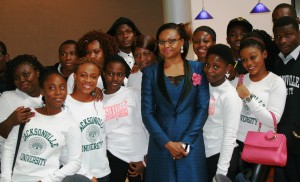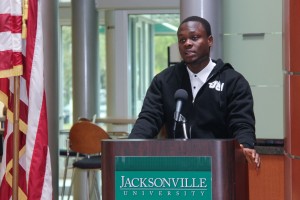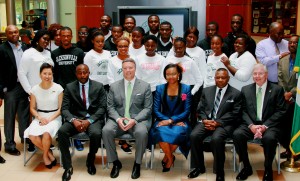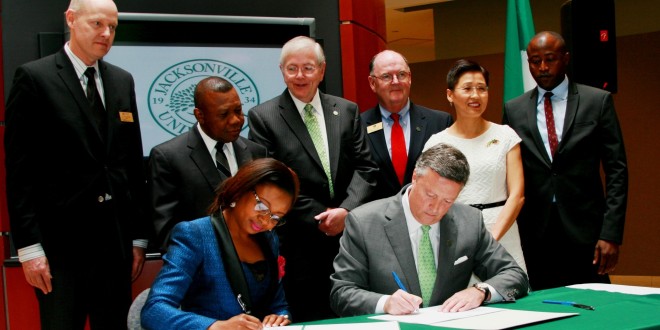Jacksonville University is the first U.S. partner in a program with Nigeria’s Petroleum Technology Development Fund to educate its country’s top young scholars in STEM-related fields, signaling a dynamic move to intensify the University’s global reach in higher education.
 With 18 members of the first cohort of 25 Nigerian undergraduates looking on, JU President Tim Cost and Timipre Wolo, Deputy Manager of the Fund’s Industry Collaboration Unit, signed the agreement in which the Fund will pay all tuition and expenses for students in the program through summer 2016. (See a Facebook photo gallery here.)
With 18 members of the first cohort of 25 Nigerian undergraduates looking on, JU President Tim Cost and Timipre Wolo, Deputy Manager of the Fund’s Industry Collaboration Unit, signed the agreement in which the Fund will pay all tuition and expenses for students in the program through summer 2016. (See a Facebook photo gallery here.)
The long-running PTDF Overseas Scholars program, which already has a footing in the United Kingdom, France, Norway and other countries, is designed to transfer knowledge and skills in STEM-related subjects to students who will then become leaders, academicians, professionals and technicians in the petroleum and solid minerals fields in Nigeria and abroad. The end result is a sharing of not only academic but cultural awareness and intelligence between host universities and Nigerian students.
“We are here to help you become better-informed, globally prepared students,” Cost said. “This is another step toward our goal of bringing a more international student body and focus not only to Jacksonville University but to the city and region.”
Since 1973, the mission of the PTDF has been to train Nigerians as graduates, professionals, technicians and craftsmen in areas such as engineering, geology, science, aviation and management related to the petroleum and solid minerals industries. Its objectives are to help develop indigenous manpower, acquire and transfer technology and knowledge, and make Nigeria a human resource center for the West African sub-region in these fields. Successful applicants to the fund’s overseas scholars program must pass rigorous screening and testing.
“This agreement marks what we hope is only the beginning of a new friendship and dynamic relationship,” Wolo said. “We have a dire need to build capacity and to have our Nigerian citizens take on more responsibilities in our industries … We could not have picked a finer university or city to continue our program as we expand into the United States.”
 Wolo noted that Jacksonville University was chosen over candidates such as Stanford University and Texas A&M University partly because of its top-rated Davis Aviation Center. In addition, in the formal Memorandum of Understanding between the two entities, the Fund praised JU for its “well-established reputation for undertaking applied research and teaching that provides graduates with tools for a life of continuous learning [and] the skills of creativity, problem-solving and leadership.”
Wolo noted that Jacksonville University was chosen over candidates such as Stanford University and Texas A&M University partly because of its top-rated Davis Aviation Center. In addition, in the formal Memorandum of Understanding between the two entities, the Fund praised JU for its “well-established reputation for undertaking applied research and teaching that provides graduates with tools for a life of continuous learning [and] the skills of creativity, problem-solving and leadership.”
JU has a long tradition of educating and empowering students from other countries, and has plans to double its international student body in the next two years, said Provost and Chief Academic Officer Wenying Xu. It recently created partnerships with universities in China, Japan, Taiwan, Germany and Scotland, as well as new relationships with organizations in the Middle East, Europe and South America.
Students from more than 90 countries have attended the University in its 81-year history, and this academic year alone, 13 foreign countries are represented among the study body, with JU offering Honors and Education Abroad programs, international internships, an active International Student Association, and distinguished faculty from around the world.
“All of this creates a microcosm of the global village,” Xu said. “Here, we produce individuals who are world-ready and work-ready. … We are confident you will excel academically and will represent your country with great pride and distinction.”
Nigeria’s growing technical and industrial industries require home-grown talent, said Nigerian Ambassador Amb Geoffrey Teneilabe. The country’s nine universities are able to accommodate only about half of qualified applicants. The Petroleum Technology Development Fund’s program is designed to continue Nigerian President Goodluck Jonathan’s “Transformation Agenda” to ensure the country’s positive direction.
“We have 5,000 Nigerians studying here in the U.S., and more are coming,” he said. “We need to produce manpower to move forward. … Countries become leaders because of knowledge and technology, and JU is a producer of doers and thinkers. I cannot think of a better institution for this cultivation.”
David Abraham, a 20-year-old Nigerian student with an interest in chemistry and international business, told the audience how honored he and his classmates were to be selected for the prestigious program.
“This is giving us a capacity to build our nation,” he said. “It’s an opportunity to learn in a different environment…. We are adjusting to the time, the weather and the food — and especially to the accents. We will be good ambassadors for JU.”
 Wave Magazine Online Jacksonville University News Hub
Wave Magazine Online Jacksonville University News Hub
